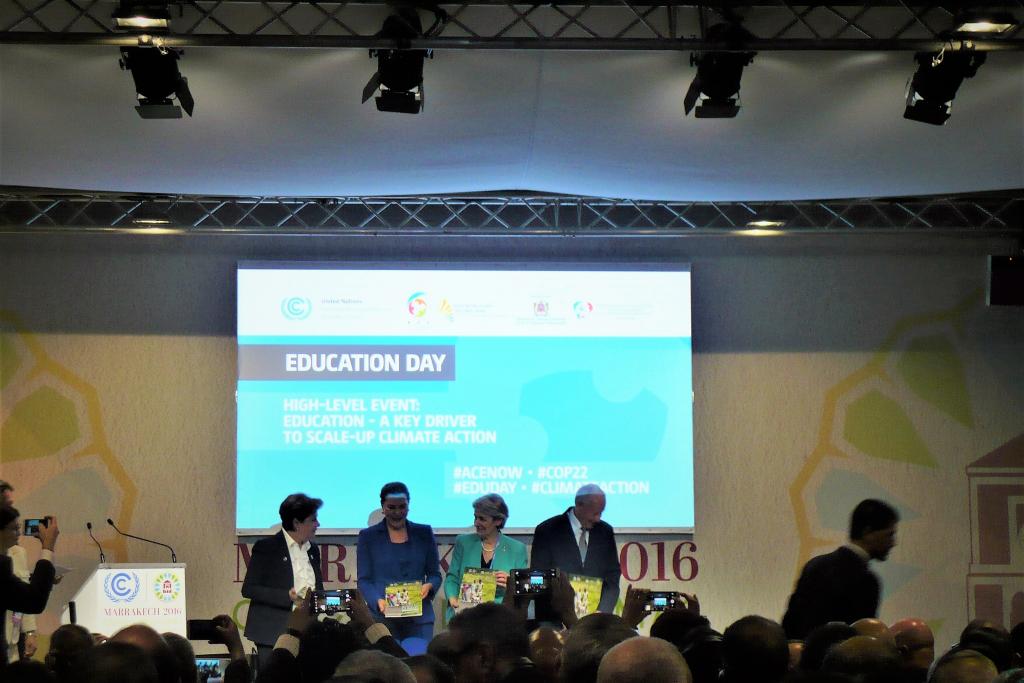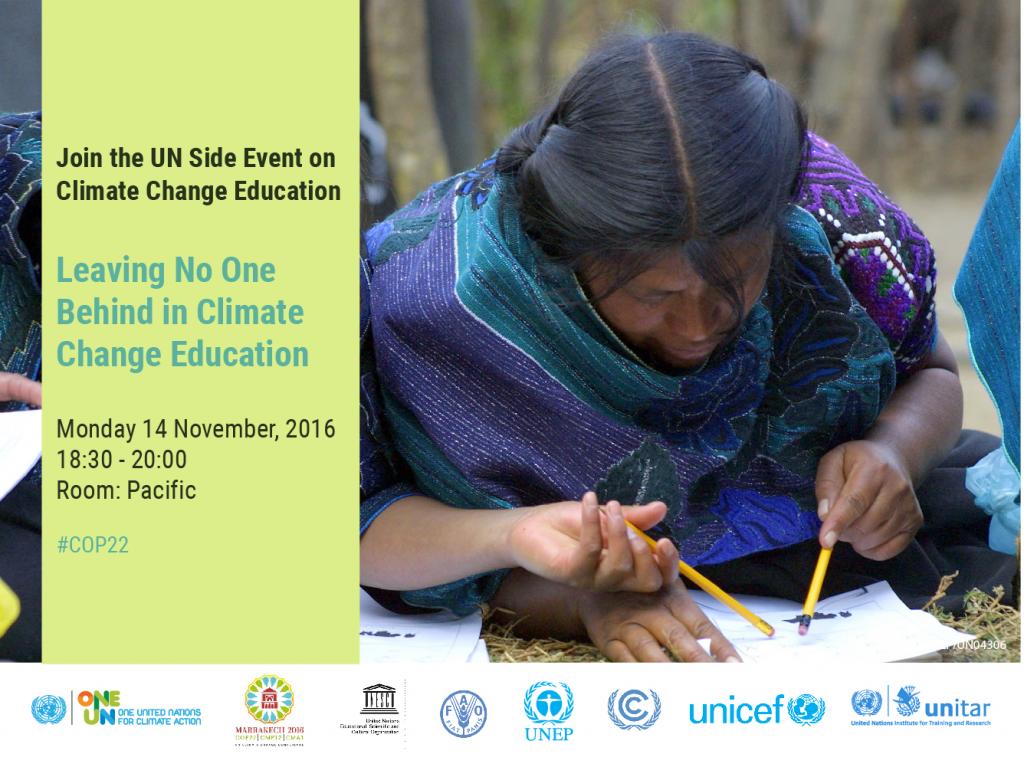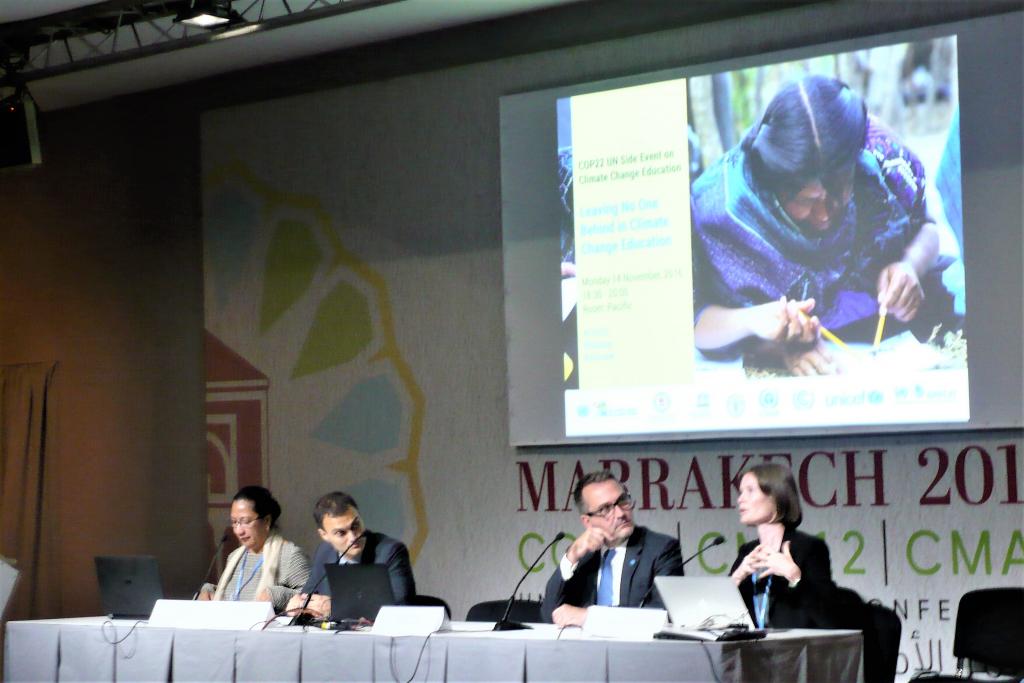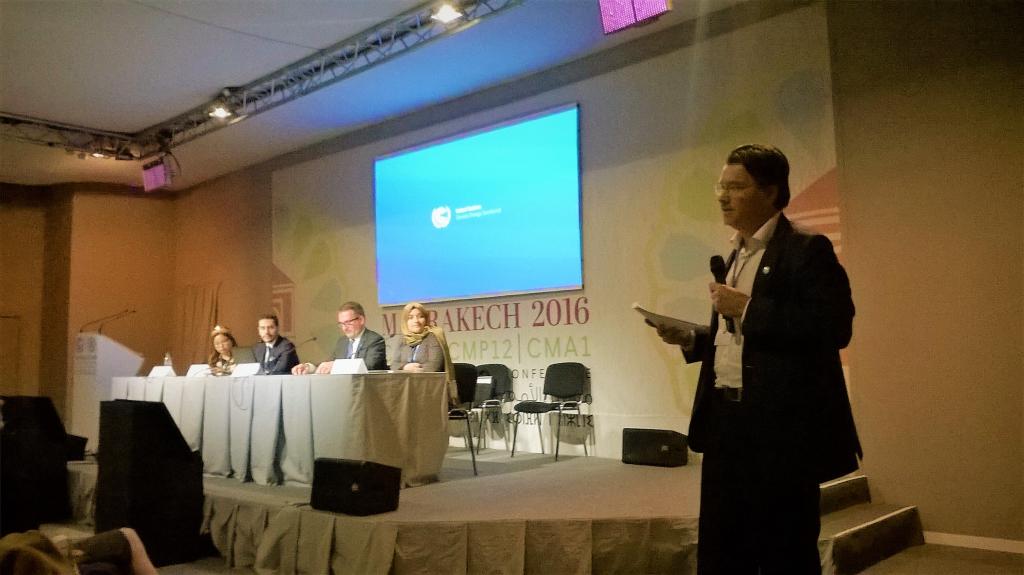UN CC:Learn Supports Education Day at COP22

1 December 2016, Marrakesh, Morocco - Education, along with training and public awareness, plays a key role in the global response to climate change, as recognized by Article 6 of the UN Framework Convention on Climate Change (UNFCCC) and Article 12 of the Paris Agreement. To knowledge the importance of this topic, a thematic day has been specifically dedicated to education during the 22nd Conferences of the Parties to the UNFCCC (COP22), held from 7 to 18 November 2016 in Marrakesh, Morocco. UN CC:Learn has supported two key events during Education Day at COP22.
High-Level Event: Climate Education as a Driver of Change
The High-Level Event: Climate Education as a Driver of Change discussed how education accelerates implementation of the Paris Agreement and the Sustainable Development Goals. The event also featured the launch of the Action for Climate Empowerment Guidelines and the 2016 Global Education Monitoring Report.


Speakers included Her Royal Highness, Princess Lalla Hasnaa of Morocco, Ms. Patricia Espinosa, Executive Secretary of UNFCCC, Ms. Irina Bokova, Director General of UNESCO, Mr. Rachid Benmokhtar Benabdellah, Minister of National Education and Vocational Training, Kingdom of Morocco, Mr. Manos Antoninis, Global Education Monitoring Report Team UNESCO and two young reporters from Morocco and Kenya. The event was moderated by Mr. Nick Nuttall, Coordinator, Communications and Outreach at the UNFCCC Secretariat.
This high-level discussion was organized by the Kingdom of Morocco and the Mohammed VI Foundation for Environmental Protection, in partnership with the UNFCCC, UNESCO and the UN Alliance on Climate Change Education, Training and Public Awareness, of which UN CC:Learn is a member.
During this event, the Action for Climate Empowerment: Guidelines for accelerating solutions through education, training and public awareness was launched by Ms. Patricia Espinosa, Executive Secretary of UNFCCC and Ms. Irina Bokova, Director General of UNESCO. This Guidelines are intended to facilitate the work of National Focal Points (NFPs) to implement Action for Climate Empowerment (ACE) activities in their countries.
Furthermore, Parties adopted the Decision -/CP.22, for improving the effectiveness of the Doha work programme on Article 6 of the Convention at COP22. By this Decision, the Conference of Parties encourage Parties to continue to promote the systematic integration of gender-sensitive and participatory education, training, public awareness, public participation and public access to information into all mitigation and adaptation activities implemented under the Convention, as well as under the Paris Agreement, including into the implementation of their nationally determined contributions and the formulation of long-term low greenhouse gas emission development strategies.
UN Side Event on Leaving No One Behind in Climate Change Education
For a real transformation of our world, it is key to promote universal access to quality education and to ensure that the rights, needs and contributions of different learners, particularly those of groups in situations of vulnerability, are taken into account when designing and promoting climate change education. The UN Side Event on Leaving No One Behind in Climate Change Education addressed the question “How can climate change education be made more inclusive and relevant to a large variety of stakeholders?”, with examples from groups with traditional learning systems and special learning needs, such as people with disabilities, indigenous peoples, and refugees.


Speakers included Mr. Manos Antoninis, Global Education Monitoring Report Team UNESCO, Ms. Luisa Manuofetoa, Deputy Chief Executive Officer of the Social Protection and Disability Division at the Ministry of Internal Affairs, Tonga, Ms. Jaime Webbe, Chief, Environmental Education and Training Unit, UNEP, Ms. Nouhad Awwad, National Coordinator of Arab Youth Climate Movement in Lebanon, Mr. Tariq Al-Olaimy, Co-founder of 3BL Associates, and Ms. Jennifer Rubis, Programme Specialist, Section on Small Islands and Indigenous Knowledge, UNESCO. The event was moderated by Mr. Martin Frick, Director of the Climate and Environment Division, FAO.

Key messages from the event include the importance of focusing on people’s key needs and interests, of working with and understand more the different communities, for instance considering local realities, languages and solutions, and of acknowledging that reaching the furthest first, does not mean doing more to include the vulnerable communities in existing and future activities but putting them at the center of such activities.
“It is clear that leaving no one behind refers to both consumers as well as providers of climate change education” highlighted Mr. Angus Mackay, Head of the UN CC:Learn Secretariat, in his concluding remarks, noting that this dialogue is just beginning.
You can access to the recording of the full side event and more articles on Education Day at COP22.
As part of its support to Education Day, UN CC:Learn has also contributed to the One UN Exhibit on Quality Education. For further information on UN CC:Learn participation at COP22, please check UN CC:Learn's website.
About UN CC:Learn
UN CC:Learn is a partnership of more than 30 multilateral organizations supporting countries to design and implement systematic, recurrent and results-oriented climate change learning. At the global level, the partnership supports knowledge-sharing, promotes the development of common climate change learning materials, and coordinates learning interventions through a collaboration of UN agencies and other partners. At the national level, UN CC:Learn supports countries in developing and implementing national climate change learning strategies. Through its engagement at the national and global levels, UN CC:Learn contributes to the implementation of Article 6 of the UNFCCC on training, education and public awareness-raising, and the 2012-2020 Doha Work Programme. Funding for UN CC:Learn is provided by the Swiss Government and UN partners. The Secretariat for UN CC:Learn is hosted by the UN Institute for Training and Research (UNITAR).
Image 1: Education Day Logo
Photo 2: Panelists of High-Level Event: Climate Education as a Driver of Change
Photo 3: Panelists of High-Level Event: Climate Education as a Driver of Change 2
Photo 4: Social Media Card for UN Side Event on Leaving No One Behind in Climate Change Education
Photo 5: Panelists of UN Side Event on Leaving No One Behind in Climate Change Education
Photo 6: Mr. Angus Mackay, Head of the UN CC:Learn Secretariat

